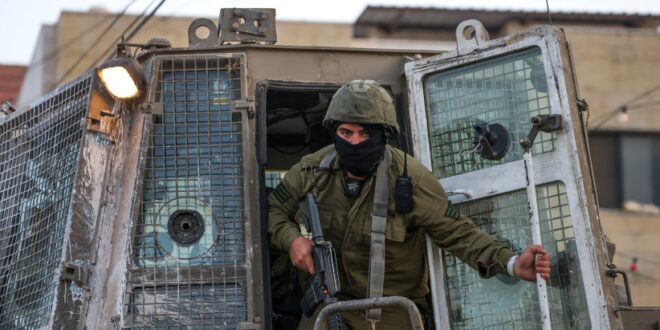Terrorism has not been laid to rest in the West Bank, following continued violent attacks.
After around 18 months of deadly terrorist attacks in the West Bank focusing mainly on the Jenin and Nablus areas of the northern West Bank, terrorism abruptly returned to Hebron on Monday.
It’s not that there has been zero deadly terrorism in the Hebron area – and definitely not zero attempts at terrorist attacks or low-grade Palestinian violence.
As OC Central Command Maj.-Gen. Yehuda Fuchs said Monday, Israel’s security forces have been regularly thwarting terrorist plots in the Hebron area.
So, what was really distinctive about the attack was that it directed attention to how unusual it has been that Hebron has been quieter than the northern West Bank. Further, what does it mean that this seemingly well-executed terrorist attack happened there?
There were also questions about whether there is a new attempted escalation by Hamas or other terrorist groups in light of the spike with the weekend attack at Huwara, plus this attack, plus two attempted drone territorial violations from the Gaza Strip.
In many past waves of terrorism, Hebron was the center of the Palestinian “resistance.”Hebron often would be put under closure for weeks or much longer at a time, while the rest of the West Bank would be open for business or face very short targeted closures.
IDF and Shin Bet (Israel Security Agency) officers would talk soberly about how even if they could get other parts of the West Bank under control, the balance of chaos with Hamas and violent Fatah cells in Hebron simply could not be completely brought under control.
Suddenly, in August 2023, terrorism in Hebron is considered a rare event, and that it occurred there raised eyebrows that if it could even happen in a quiet place like Hebron, maybe there is a new giant terrorist wave on the way.
This was not the way senior defense officers understood the situation in public and in private on Monday, though there was some slightly elevated sense of anxiety about the spike in terrorism over the last few days and the idea that a new front could open in Hebron.
Senior IDF officers even emphasized that currently catching the terrorists in the Hebron attack is a high priority, but it is only secondary to an increased defensive presence in Hebron to nip in the bud any chance of a new wave coming from there before it can happen.
So what does it mean?
Given the number of thwarted attempted terrorist attacks in Hebron in 2022-2023, it probably just means that until now, the IDF has gotten “lucky” that it has stopped most terrorist attacks, and that its luck ran out.
The two main long-term games now are debates over a “Jenin 2” and the potential for normalization with the Saudis and the impact that might have on the Palestinian situation.
The security forces and moderate elements in the government want to let the Palestinian Authority reassert itself and do not want to rush into another massive operation like the one that took place in Jenin on July 3-4 anytime soon. More right-wing elements of the coalition want a much bigger version of Jenin – and already yesterday.
The Saudis want Israel to give some part of Area C to the Palestinians and to make some other gestures that would fall short of a resolution but could create positive energy and reduce terrorism. There have been few signs regarding what Israel is willing to give, however, and whether Washington and Jerusalem will give the Saudis a full civilian nuclear program.
When the motivation for terrorism in the West Bank is as high and spread out as it is now, and with no grander diplomatic or military solution being offered on the horizon, there will probably continue to be more surprises – and not fewer – of where terrorist incidents jump out in “new” areas.
 Eurasia Press & News
Eurasia Press & News




